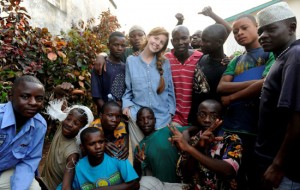 In her latest journey abroad, Stacey visits the Democratic Republic of Congo to look at the process of demobilising child soldiers. Personally I love Stacey’s ‘what can I do to help right here and right now approach’, while at the same time being painfully aware of the fact that her efforts are a drop in the ocean compared to what needs to be done to resolve the underlying causes of conflict in Africa, if, indeed, we can ever really figure out what those underlying causes are with any level of certainty.
In her latest journey abroad, Stacey visits the Democratic Republic of Congo to look at the process of demobilising child soldiers. Personally I love Stacey’s ‘what can I do to help right here and right now approach’, while at the same time being painfully aware of the fact that her efforts are a drop in the ocean compared to what needs to be done to resolve the underlying causes of conflict in Africa, if, indeed, we can ever really figure out what those underlying causes are with any level of certainty.
One of the blog comments below criticises Stacey and the programme for failing to report on the complexities of the crisis of the DRG. Stacey clearly isn’t an academic – but she is genuinly compassionate – and I’m moving towards the idea that what the developing world really needs is less westerners researching and analysing its problems and potential solutions and more people actually going out there and just bloody well doing something.
A couple of comments on the programme –
One –
I was just watching this program, and i think that Stacey Dooley is doing a absolutly a wonderful thing for those people in the program.
I would just like to say that while i was watching this i got a bit emotional, i really really felt for some of these children and what they have gone through.
I think what Stacey Dooley and the bbc are doing is amazing by making this issue more known.
I would love the chance to help people from situations like this.
🙂 xxx
Two –
1. At 4:14pm on 07 Oct 2010, dakar110 wrote: This is now, what? …the fourth programme that Dooley has fronted exposing child labour/ abuse in conflict zones for the BBC?
While I wish her every success in her burgeoning broadcasting career (better than flogging perfume at Luton airport, which I understand was her previous occupation) I cannot help but wonder what kind of contribution these programmes are really making to the development debate.
I dont doubt Dooley’s passion and sense of injustice about what she has encountered, but is it really appropriate to send someone like her, with clearly such limited knowledge of the subject, to report from places like the DRC, Nepal and West Africa?
The fact is that Zaire/ Congo has been in a state of huge internal conflict/ full blown war since independence.
And, like most African nations, the country is NOT intrinsically poor. It’s home to one of the world’s biggest deposits of coltan, the mineral used in mobile phone production, as well as some of the continents biggest timber and rubber reserves. (The Belgians didnt go there for the climate)
But it’s suffered from the ruinous reign of a series of despots, most recently President Mobutu Sese Soko, one of Africa’s most corrupt and kleptocratic rulers.
He bankrolled the genocide in Rwanda, while at the same time ripping off vast inflows of international aid, the like of which Ms Dooley is already promoting here in her blog. (More charity from the West being the perpetual answer to Africa’s problems, of course.)
These situations are NEVER simple and more money is ALMOST never the answer.
Sorry Stacey, but we cant save these people – more to the point they dont really want us to.
It’s fifty years now since independence. Africa has to get it’s own house in order, and we have to let them.
I think I might ask some students which of the above they would be more inclined to agree with.
This post – relevant to the ‘war and conflict’ section of the our Global Development Module.